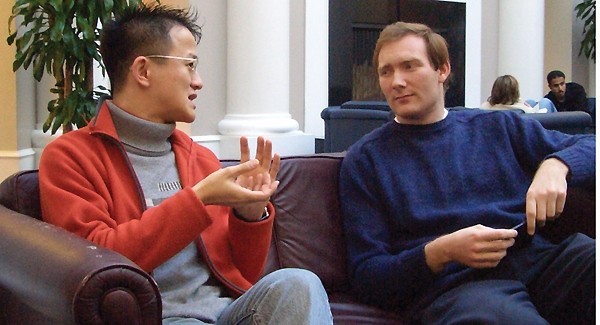
Program connects students for conversation, learning
The Conversation Buddy Program, where non-native Englishspeakers are paired with natives for a semester, began informallyin the spring of 1999 through the office of General Education,according to John Wheeler, Director of the English as a SecondLanguage Program.
When organizers received hundreds of responses they decided tomake the process more formal for the future. Today, there are 24non-native speakers in the program and only 14 of them have beenpaired carefully, with native speakers so far this semester, JulianGuevara, assistant to the Office of General Education said.
“There are always many more international students waitingfor buddies,” Yi Jin, an international student currently inthe buddy program said.
Last month organizers sent the application to all studentsthrough a mass email. The application includes a series ofquestions regarding prospective participants’ history andwhat cultural background partner they would like.
Sometimes native English speakers cannot be paired up withsomeone from a country they prefer. For example, Spanish speakersare a popular choice for English speakers. The problem is thatthere may be only two Spanish speakers who apply for the programwith over 10 English speakers.
Guevara contacts students before pairing them with a non-nativespeaker from another country. “I want to make sure they arewilling to work with someone else rather than me pairingthem,” Guevara said.
In some instances, Guevara won’t even get a response backfrom native speakers or if he does these students don’t wanta partner from a country other than their earlier preference.
Some of the languages of non-native speakers include Spanish,Korean, Thai, Japanese, Chinese and Arabic.
Wheeler said that the program’s success is purely based onstudent feedback.
These classes are described as elective classes except for theRhetoric English courses, which are required for first-yearundergraduates. The elective ESL classes include communicationskills, writing and grammar and teacher’s assistantpresentation classes.
CBP organizers believe that students currently in ESL classesnot only show the effort by taking the pass/fail courses, but willalso benefit from the continuous in-class and out-of classpractice.
Faisal Alfahad, a second-year judicial doctor candidate fromKuwait, and Jin, a cinema and television graduate student fromChina, had both applied in the past when they weren’t in ESLclasses. This semester they are and each have a partner.
Partners are required to meet at least once a week for an hour.In this hour they speak only English and learn about eachother’s cultural background, Guevara said.
This two-way exchange of culture is one attribute that separatesSMU’s program from other schools such as the University ofDallas and Texas Christian University, Wheeler said.
Jin and his buddy Clint Brown, a senior music performance major,normally meet for an afternoon rather than only an hour, Jin said.They talk about their common interests in music, film andtelevision. Brown is also very interested in the various aspects ofthe Chinese culture including its music, he said.
Professionally, Alfahad and his partner Alba Serano, a juniorfinance and economics double major, will meet for the first time onThursday.
Serano is intrigued with the Middle Eastern culture not onlybecause of current events, but also because she has friends of thatcultural background including her Lebanese boyfriend.
Alfahad is attracted to CBP because most of his friends sharehis cultural background and speak Arabic. Here Alfahad is forced tospeak English. Alfahad and Jin both learned English in their homecountries. Alfahad studied the language for eight years in Kuwait,while Jin spent 15 years in China. The issue is that internationalstudents normally learn English from a non-native speaker. Alfahadhad Kuwaiti and Egyptians teachers for his English classes.
While Jin and Alfahad were trying to get buddies in the past,Brown and Serano had other ones. Alfahad is Serano’s secondbuddy.
In the spring of 2003, Serano was buddies with a Chineseengineering graduate student, who is currently pregnant and askingSerano for baby name ideas, she said.
Jin is technically Brown’s fifth buddy. Brown said that hecouldn’t disregard the mass emails sent to students at thebeginning of each semester. Brown’s past buddies were French,Taiwanese and Chinese. He also said that he was unable to meet withtwo of past buddies due to scheduling conflicts.
Guevara said sometimes midway through a semester buddies breakup, normally because the native English speakers have a heavy classload and do not want their grades to suffer. At the same time atthe end of each semester Guevara normally receives numerous thankyou emails from participants.
Wheeler finds it fascinating that while CBP was originallyintended for undergraduate international students most participantsare graduate students.
In most cases, graduate students have more time, are willing todevote more time to the program and are in a different stage oflife than undergraduates, Wheeler said.
By joining this program, native English speakers may now receivea portion of the out-of class credit needed for Wellness I, PeterGifford, Director of the Wellness Program said.
In the past, students could fulfill a portion of their WellnessII credit, but the General Education Council asked that thedepartment move the requirement, he said.
While school credit may attract native English participants,good friendships and are the best attributes, according to Serano.”You really don’t know these people are out thereunless you get involved in the program,” she said.








